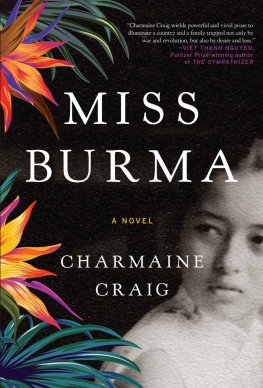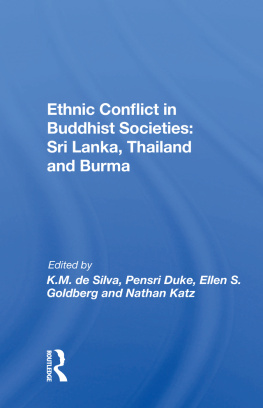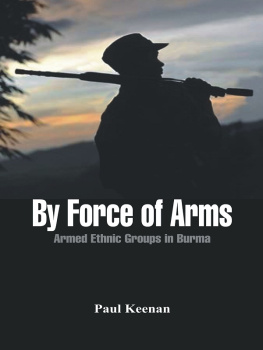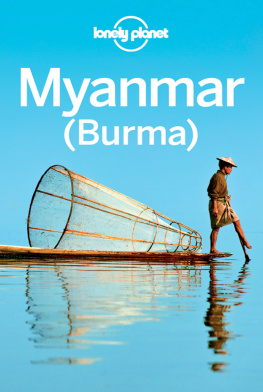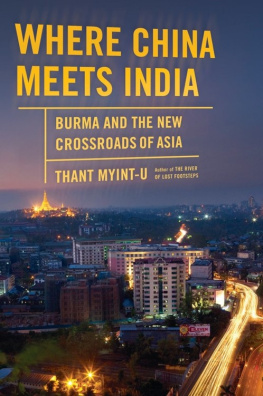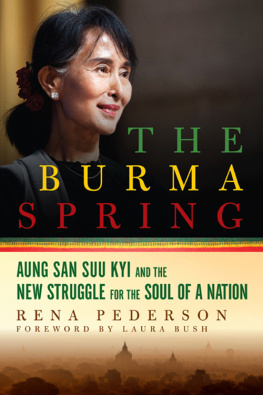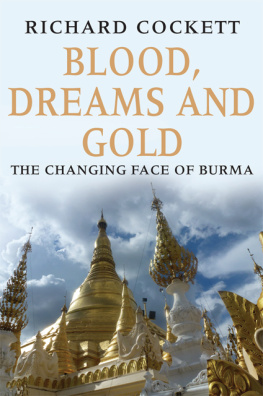Contents
About the Author
Benedict Rogers is a writer and journalist working for the international human rights organisation CSW. Specialising in Asia, he is a regular contributor to international media including the Wall Street Journal, International Herald Tribune, New York Times, Australian, Asahi Shimbun, Huffington Post, Guardian and Daily Telegraph, as well as the BBC, CNN and Sky. Invited to give briefings and speeches round the world, he has addressed audiences at venues such as the White House, European Parliament, House of Commons, Japanese Parliament and Oxford University. Currently living in London, his focus has been on Burma for much of the past fifteen years, travelling almost forty times to the country and all of its borders.
Also by Benedict Rogers
Than Shwe: unmasking Burmas tyrant
A Land without Evil: stopping the genocide of Burmas Karen people.
Burma
A Nation at the Crossroads
Benedict Rogers
For the people of Burma, that they may know true freedom, real peace and genuine democracy, and that they may celebrate the beauty of unity in diversity.
Authors Note
ON 26 MAY 1989 the military regime in Burma changed the name of the country to Myanmar. The democracy movement and the leaders of the ethnic resistance organisations, however, continue to use Burma, and have urged the international community to do the same. They argue that the regime had no mandate to change the name of the country. In this book, therefore, I use Burma and not Myanmar, except in direct quotations from other sources.
The regime also changed the names of various cities and divisions. Rangoon became Yangon, the Irrawaddy Division became Ayeyarwady and Maymyo became Pyin Oo Lwin. Karen State is called Kayin, while Karenni is Kayah. I have generally used the older names Rangoon instead of Yangon, Irrawaddy instead of Ayeyarwady and Karen rather than Kayin, because they are more easily recognisable for international readers.
The Burma Army is commonly known as the Tatmadaw, and so I use the terms Burma Army and Tatmadaw interchangeably. The regime was officially called the State Law and Order Restoration Council (SLORC) from 19881997, and then the State Peace and Development Council (SPDC) until 2010, and so in some parts of the book I use these terms.
All references from other works are sourced in the endnotes. Any unsourced material should usually be understood to have come from direct interviews conducted by the author with sources, whether named or unnamed.
Glossary
AAPP | Assistance Association for Political Prisoners |
ABMA | All Burma Monks Alliance |
ABMRC | All Burma Monks Representative Committee |
ABSDF | All Burma Students Democratic Front |
ABSDMO | All Burma Students Democratic Movement Organisation |
AFPFL | Anti-Fascist Peoples Freedom League |
ARNO | Arakan Rohingya National Organisation |
ASEAN | Association of Southeast Asian Nations |
BSPP | Burma Socialist Programme Party |
CHRO | Chin Human Rights Organisation |
CNF | Chin National Front |
CNLD | Chin National League for Democracy |
CPB | Communist Party of Burma |
CPCS | Centre for Peace and Conflict Studies |
CSW | Christian Solidarity Worldwide |
DAB | Democratic Alliance of Burma |
DDSI | Directorate of Defense Services Intelligence |
DFID | Department for International Development |
DKBA | Democratic Karen Buddhist Army |
DKBO | Democratic Karen Buddhist Organisation |
DPNS | Democratic Party for a New Society |
DSA | Defense Services Academy |
DVB | Democratic Voice of Burma |
EAT | Emergency Assistance Team |
ENC | Ethnic Nationalities Council |
ICRC | International Committee of the Red Cross |
IPAD | Institute for Political Analysis and Documentation |
IRC | International Rescue Committee |
KDNG | Kachin Development Networking Group |
KIA | Kachin Independence Army |
KIO | Kachin Independence Organisation |
KNO | Kachin National Organisation |
KNDO | Karen National Defence Organisation |
KNO | Karenni National Organisation |
KNU | Karen National Union |
KNLA | Karen National Liberation Army |
KNPP | Karenni National Progressive Party |
MNDAA | Myanmar National Democracy Alliance Army |
MPF | Mon Peoples Front |
NCGUB | National Coalition Government of the Union of Burma |
NCUB | National Council of the Union of Burma |
NDF | National Democratic Front |
NLD | National League for Democracy |
NMSP | New Mon State Party |
NUP | National Unity Party |
NUPA | National United Party of Arakan |
RANIR | Relief Action Network for IDP and Refugee |
RPF | Rohingya Patriotic Front |
RSO | Rohingya Solidarity Organisation |
SHRF | Shan Human Rights Foundation |
SHAN | Shan Herald Agency for News |
SLORC | State Law and Order Restoration Council |
SNLD | Shan Nationalities League for Democracy |
SPDC | State Peace and Development Council |
SSA | Shan State Army |
SWAN | Shan Womens Action Network |
UNDP | United Nations Development Programme |
UNHCR | United Nations High Commissioner for Refugees |
USDA | Union Solidarity Development Association |
USDP | Union Solidarity and Development Party |
UWSA | United Wa State Army |
WFP | World Food Programme |
WPN | Wanpawng Ninghtoi |
Foreword by The Most Reverend Desmond M. Tutu
THE PEOPLE OF Burma have been struggling for almost fifty years against two twin challenges: a brutal military dictatorship among the very worst in the world, and the apathy and inaction of too many people in the rest of the world.
Next page

